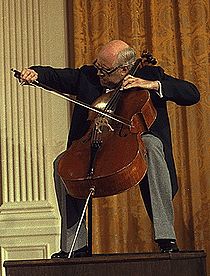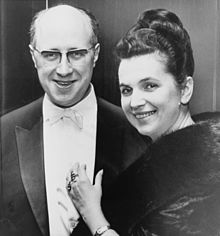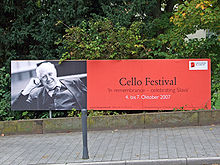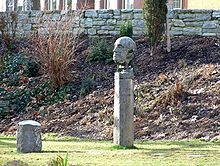- Mstislav Rostropovich
-
Mstislav Leopoldovich Rostropovich, KBE (Russian: Мстисла́в Леопо́льдович Ростропо́вич, Mstislav Leopol'dovič Rostropovič, pronounced [rəstrɐˈpɔvʲɪtɕ]; March 27, 1927 – April 27, 2007), known to close friends as Slava, was a Soviet and Russian cellist and conductor. He was married to the soprano Galina Vishnevskaya. He is widely considered to have been the greatest cellist of the second half of the 20th century, and one of the greatest of all time. In addition to his outstanding interpretations and technique, he was well-known for his commissions of new works which enlarged the cello repertoire more than any cellist before or since. He gave the premieres of over 100 pieces.[1]
Rostropovich was internationally recognized as a staunch advocate of human rights, and was awarded the 1974 Award of the International League of Human Rights.
Contents
Early years
Rostropovich was born in Baku, Azerbaijan SSR, USSR, to ethnic Russian parents who had moved from Orenburg.[2] His father, Leopold Vitoldovich Rostropovich, was also partly of Belarusian-Polish noble descent.[3] That part of his family bore the Bogorya coat of arms, which was located at the family palace in Skotniki, Masovian Voivodeship. He grew up in Baku and spent his youth there. During World War II his family moved back to Orenburg and then in 1943 to Moscow.[4]
At the age of four, Rostropovich learned the piano with his mother, Sofiya Nikolaevna Fedotova, a talented pianist. He began the cello at the age of 10 with his father, who was a renowned cellist and former student of Pau Casals.[5]
In 1943, at the age of 16, he entered the Moscow Conservatory. Until 1948 he studied cello, piano, conducting and composition. His teachers included Dmitri Shostakovich and Sergei Prokofiev. In 1945 he came to prominence as a cellist when he won the gold medal in the first ever Soviet Union competition for young musicians.[5] He became professor of cello at the Moscow Conservatory in 1956.
First concerts
Rostropovich gave his first cello concert in 1942. He won first prize at the international Music Awards of Prague and Budapest in 1947, 1949 and 1950. In 1950, at the age of 23 he was awarded what was then considered the highest distinction in the Soviet Union, the Stalin Prize.[6] At that time, Rostropovich was already well known in his country and while actively pursuing his solo career, he taught at the Leningrad (Saint-Petersburg) Conservatory and the Moscow Conservatory. In 1955, he married Galina Vishnevskaya, soprano at the Bolshoi Theatre.[7]
Rostropovich had working relationships with Soviet composers of the era. In 1949 Sergei Prokofiev wrote his Cello Sonata in C, Op. 119, for the 22-year old Rostropovich, who gave the first performance in 1950, with Sviatoslav Richter. Prokofiev also dedicated his Sinfonia Concertante for cello to him; this was premiered in 1952. Rostropovich and Dmitry Kabalevsky completed Prokofiev's Cello Concertino after the composer's death. Dmitri Shostakovich wrote both his first and second cello concertos for Rostropovich, who also gave their first performances.
His international career started in 1963 in the Conservatoire of Liège (with Kirill Kondrashin) and in 1964 in West Germany. Rostropovich went on several tours in Western Europe and met several composers, including Benjamin Britten. Britten dedicated his Cello Sonata, three Solo Suites, and his Cello Symphony to Rostropovich, who gave their first performances. In 1967, he conducted Tchaikovsky's opera Eugene Onegin at the Bolshoi, thus letting forth his passion for both the role of conductor and the opera.
Proms on August 21, 1968
Rostropovich played at The Proms on the night of August 21, 1968. He played with the Soviet State Symphony Orchestra and it was the orchestra's debut performance at the Proms. The programme featured Czech composer Antonín Dvořák's Cello Concerto and was the same day that Russians invaded Czechoslovakia to put an end to Alexander Dubček's Prague Spring.[8]
Exile
Rostropovich fought for art without borders, freedom of speech, and democratic values, resulting in harassment from the Soviet regime. An early example was in 1948, when he was a student at the Moscow Conservatory. In response to the 10 February 1948 decree on so-called 'formalist' composers, his teacher Dmitri Shostakovich was dismissed from his professorships in Leningrad and Moscow; the then 21-year-old Rostropovich quit the conservatory, dropping out in protest. In 1970, Rostropovich sheltered Aleksandr Solzhenitsyn, who otherwise would have had nowhere to go, in his own home. His friendship with Solzhenitsyn and his support for dissidents led to official disgrace in the early 1970s. As a result, Rostropovich was restricted from foreign touring, as was his wife, soprano Galina Vishnevskaya, and he was sent on a recital tour of small towns in Siberia.
Rostropovich left the Soviet Union in 1974 with his wife and children and settled in the United States. He was banned from several musical ensembles in his homeland, and his Soviet citizenship was revoked in 1978 because of his public opposition to the Soviet Union's restriction of cultural freedom. He would not return to the Soviet Union until 1990.[6]
Further career
From 1977 until 1994, he was musical director and conductor of the U.S. National Symphony Orchestra in Washington, while still performing with some of the most famous musicians such as Martha Argerich, Sviatoslav Richter and Vladimir Horowitz.[9] He was also the director and founder of the Rostropovich Music Festival and was a regular performer at the Aldeburgh Festival in the UK.[10]
His impromptu performance during the fall of the Berlin Wall as events unfolded earned him international fame and was reported throughout the world.[11] His Soviet citizenship was restored in 1990, although he and his family had already become American citizens.
In modern Russia, Rostropovich was welcomed by high officials. He supported Boris Yeltsin during the 1993 constitutional crisis (Rostropovich conducted the National Symphony Orchestra in Red Square at the height of the crackdown),[12] and was also on friendly terms with Vladimir Putin.
In 1993 he was instrumental in the foundation of the Kronberg Academy and was a patron until his death. He commissioned Rodion Shchedrin to compose the opera Lolita and conducted its premiere in 1994 at the Royal Swedish Opera.
Rostropovich received many international awards, including the French Legion of Honor and honorary doctorates from many international universities. He was an activist, fighting for freedom of expression in art and politics. An ambassador for the UNESCO, he supported many educational and cultural projects.[13] Rostropovich performed several times in Madrid and was a close friend of Queen Sofía of Spain.
Rostropovich and his wife, Galina Vishnevskaya founded the Rostropovich-Vishnevskaya Foundation, a publicly-supported non-profit 501(c)(3) organization based in Washington, D.C., in 1991 to improve the health and future of children in the former Soviet Union. The Rostropovich Home Museum opened on March 4, 2002, in Baku.[14] Rostropovich and Vishnevskaya visited Azerbaijan occasionally. Rostropovich also presented cello master classes at the Azerbaijan State Conservatory.
Together they formed a valuable art collection. In September 2007, when it was slated to be sold at auction by Sotheby's in London and dispersed, Russian billionaire Alisher Usmanov stepped forward and negotiated the purchase of all 450 lots, in order to keep the collection together and bring it to Russia as a memorial to the great cellist's memory. Christie's reported that the buyer paid a "substantially higher" sum than the £20 million pre-sale estimate[15]
In 2006, he was featured in Alexander Sokurov's documentary Elegy of a life: Rostropovich, Vishnevskaya.[16]
His instruments included the 1711 Duport Stradivarius, a Storioni on which he made most of his recordings and a Peter Guarneri of Venice.
Later life
Rostropovich's health declined in 2006, with the Chicago Tribune reporting rumors of unspecified surgery in Geneva and later treatment for what was reported as an aggravated ulcer. Russian President Vladimir Putin visited Rostropovich to discuss details of a celebration the Kremlin was planning for March 27, 2007, Rostropovich's 80th birthday. Rostropovich attended the celebration but was reportedly in frail health.
Though Rostropovich's last home was in Paris, he maintained residences in Moscow, St. Petersburg, London, Lausanne, and Jordanville, New York. Rostropovich was admitted to a Paris hospital at the end of January 2007, but then decided to fly to Moscow, where he had been receiving care.[17] On February 6, 2007 the 79-year-old Rostropovich was admitted to a hospital in Moscow. "He is just feeling unwell", Natalya Dolezhale, Rostropovich's secretary in Moscow, said. Asked if there was serious cause for concern about his health she said: "No, right now there is no cause whatsoever." She refused to specify the nature of his illness. The Kremlin said that President Vladimir Putin had visited the musician on Monday in the hospital, which prompted speculation that he was in a serious condition. Dolezhale said the visit was to discuss arrangements for marking Rostropovich's 80th birthday. On March 27, 2007, the Russian President Vladimir Putin issued a statement praising Rostropovich.[18]
He re-entered the Blokhim Cancer Institute on April 7, 2007, where he was treated for intestinal cancer. He died on April 27, 2007.[11][19][20]
On April 28, Rostropovich's body lay in an open coffin at the Moscow Conservatory,[21] where he once studied as a teenager, and was then moved to the Church of Christ the Saviour. Thousands of mourners, including Russian President Vladimir Putin, bade farewell. Spain's Queen Sofia, French first lady Bernadette Chirac and President Ilham Aliev of Azerbaijan, where Rostropovich was born, as well as Naina Yeltsina, the widow of Boris Yeltsin, were among those in attendance at the funeral on April 29. Rostropovich was then buried in the Novodevichy Cemetery, the same cemetery where his friend Boris Yeltsin was buried four days earlier.[22]
Stature
Rostropovich was a huge influence on the younger generation of cellists. Many have openly acknowledged their debt to his example. In the Daily Telegraph, Julian Lloyd Webber called him "probably the greatest cellist of all time."[23]
Rostropovich either commissioned or was the recipient of compositions by many composers including Dmitri Shostakovich, Sergei Prokofiev, Benjamin Britten, Henri Dutilleux, Olivier Messiaen, Witold Lutosławski, Luciano Berio, Krzysztof Penderecki, Leonard Bernstein, Alfred Schnittke, Aram Khachaturian, Ástor Piazzolla, Sofia Gubaidulina, Arthur Bliss and Lopes Graça. His commissions of new works enlarged the cello repertoire more than any cellist before or since.
He was the first performer of 117 pieces,[1] and is well known for his interpretations of Dvořák's Cello Concerto in B minor and Haydn's cello concerti in C and D,[citation needed] Prokofiev's Symphony-Concerto and the two cello concerti of Shostakovich. Between 1997 and 2001 he was intimately involved in the development and testing of the BACH.Bow,[24] a curved bow designed by the cellist Michael Bach. In 2001 he invited Michael Bach for a presentation of his BACH.Bow to Paris (7ème Concours de violoncelle Rostropovitch).[25] In July 2011, the city of Moscow announced plans to erect a statue of Rostropovich in a central square.[26]
Awards and recognitions
Rostropovich received about 50 awards during his life, including:
- Grammy Award for Best Chamber Music Performance (1984)
- Mstislav Rostropovich & Rudolf Serkin for Brahms: Sonata for Cello and Piano in E Minor, Op. 38 and Sonata in F, Op. 99
- Polar Music Prize, 1995
- Gold Medal of the Royal Philharmonic Society (1970)
- Ernst von Siemens Music Prize 1976
- Sonning Award (1981; Denmark)
- Citizen of Honor of Orenburg, Russia (1993)
- Sharaf Order (Order of Honor) of the Republic of Azerbaijan
- Istiglal Order (Order of Sovereignty) of Azerbaijan (March 3, 2002)[27]
- Honorary KBE from Queen Elizabeth II in 1987
- In 1987, Rostropovich was presented with the Presidential Medal of Freedom by President Ronald Reagan.
- Prince of Asturias Awards, 1997 (jointly with Yehudi Menuhin)
- Citizen of honor of Vilnius, Lithuania (2000)
- Konex Decoration granted by de Konex Foundation of Argentina in 2002.
- Order of Service to the Fatherland, First Degree, for his "outstanding contribution to the development of world music and many years of creative activity," presented by President Vladimir Putin, February 26, 2007.
- Queen Beatrix of the Netherlands awarded him the rare Medal for Art and Science (Dutch: "Eremedaille voor Kunst en Wetenschap") of the House-Order of Orange.
- Laurea ad honorem at the University of Bologna in Political Science, 2006.
- He was a recipient of Yale University's Sanford Medal.[28]
- Honorary Membership of the Royal Academy of Music, London.[29]
- The gold UNESCO Mozart Medal, 2007.[30]
References
- ^ a b Olga Sobolevskaya (27 April 2007). "Mstislav Rostropovich: musician of genius, man of honor". RIA Novosti. http://en.rian.ru/analysis/20070427/64560235.html. Retrieved 2007-04-30.
- ^ Valentin Shutilova (16 May 2007). "Азиопа. Часть вторая. Дом - музей семьи Ростроповичей в Оренбурге" (in Russian). Svali.ru. http://www.svali.ru/print_story.php?st_id=1105. Retrieved 2007-08-06.
- ^ Michael Birukoff. "Rostropovich Family Name" (in Russian). All Russia Family Tree. http://www.vgd.ru/R/rostpchn.htm#%F2%CF%D3%D4%D2%CF%D0%CF%D7%C9%DE. Retrieved 2007-08-04.
- ^ "Mstislav Rostropovich: Obituary". The Times (London). 28 April 2007. http://www.timesonline.co.uk/tol/comment/obituaries/article1717247.ece. Retrieved 2007-08-04.
- ^ a b "Mstislav Rostropovich biography". Sony Classical. http://www.sonyclassical.com/artists/rostropovich/bio.html. Retrieved 2007-04-30.
- ^ a b "Mirė maestro M.Rostropovičius" (in Lithuanian). Lietuvos rytas. 28 April 2007. http://www.lrytas.lt/?id=11776666481176558153&view=4. Retrieved 2007-04-30.
- ^ "Biography of Mstislav Rostropovitch". UNESCO. http://portal.unesco.org/en/ev.php-URL_ID=9925&URL_DO=DO_TOPIC&URL_SECTION=201.html. Retrieved 2007-04-30.
- ^ "For One Night Only - The Prom of Peace". BBC Radio 4. 1 September 2007. http://www.bbc.co.uk/radio4/foronenightonly/pip/jqmqo/. Retrieved 2008-08-17.
- ^ Encyclopædia Britannica (27 April 2007). "National Symphony Orchestra". Encyclopædia Britannica Online. http://www.britannica.com/eb/article-9002382/National-Symphony-Orchestra. Retrieved 2007-04-30.
- ^ Rostropovich remembered – Britten-Pears Foundation, Undated.Retrieved on 2007-07-31.
- ^ a b "Russian maestro Rostropovich dies". BBC News. 2007-04-27. http://news.bbc.co.uk/2/hi/europe/6598895.stm. Retrieved 2007-04-30.
- ^ Steven Erlanger (September 27, 1993). "Isolated Foes of Yeltsin Are Sad but Still Defiant". The New York Times. http://query.nytimes.com/gst/fullpage.html?res=9F0CEEDF1039F934A1575AC0A965958260. Retrieved 2008-05-29.
- ^ "UNESCO Celebrity Advocates: Mstislav Rostropovitch". UNESCO. http://portal.unesco.org/en/ev.php-URL_ID=8327&URL_DO=DO_TOPIC&URL_SECTION=201.html. Retrieved 2007-04-30.
- ^ Gulnar Aydamirova (Summer 2003). "Rostropovich The Home Museum". Azerbaijan International. http://www.azer.com/aiweb/categories/magazine/ai112_folder/112_articles/112_rostropovich.html. Retrieved 2007-04-30.
- ^ News.BBC.co.uk, 17 September 2007.
- ^ Variety.com
- ^ Alan Kozinn (April 27, 2007). "Mstislav Rostropovich, Cellist and Conductor, Dies". New York Times.
- ^ "Russian President Marks World-renowned Musician's 80th Birthday". VOA News (Voice of America). 27 March 2007. http://www.voanews.com/english/archive/2007-03/2007-03-27-voa53.cfm. Retrieved 1 January 2009.[dead link]
- ^ "Russian Conductor, Composer, Cellist Rostropovich Dies". VOA News (Voice of America). 27 April 2007. http://www.voanews.com/english/archive/2007-04/2007-04-27-voa17.cfm. Retrieved 1 January 2009.[dead link]
- ^ "Russian cellist Rostropovish 'seriously ill'". Contactmusic. http://www.contactmusic.com/news.nsf/article/russian%20cellist%20rostropovich%20seriously%20ill_1028951. Retrieved 2007-04-30.
- ^ "Russian Musician Rostropovich Honored Before Burial". VOA News (Voice of America). 28 April 2007. http://www.voanews.com/english/archive/2007-04/2007-04-28-voa29.cfm. Retrieved 1 January 2009.
- ^ "Russian farewell to Rostropovich". BBC News. 29 April 2007. http://news.bbc.co.uk/2/hi/europe/6604875.stm. Retrieved 2007-04-30.
- ^ Julian Lloyd Webber (28 April 2007). "The greatest cellist of all time". The Telegraph (London). http://www.telegraph.co.uk/news/main.jhtml?xml=/news/2007/04/27/nros227.xml. Retrieved 2007-08-06.
- ^ http://bach.bogen.pagespro-orange.fr/html/mstislav_rostropovich.htm
- ^ http://www.cello.org/Newsletter/Articles/bachbogen/bachbogen.htm
- ^ http://www.artsjournal.com/slippeddisc/2011/07/cellist-to-have-monument-in-the-middle-of-moscow.html
- ^ "M. L. Rostropoviçin "İstiqlal"ordeni ilə təltif edilməsi haqqında AZƏRBAYCAN RESPUBLİKASI PREZİDENTİNİN FƏRMANI [Order of the President of Azerbaijan Republic on awarding M. L. Rostropovich with Istiglal Order of Azerbaijan Republic]". http://e-qanun.az/print.php?internal=view&target=1&docid=1412&doctype=0. Retrieved 2011-01-20.
- ^ Leading clarinetist to receive Sanford Medal
- ^ "Rostropovich:The Honors & Awards". http://www.fanfaire.com/rost/rosthon.html. Retrieved 13 September 2009.
- ^ "Death of master Russian cellist and UNESCO Goodwill Ambassador mourned". 27 April 2007. http://www.un.org/apps/news/story.asp?NewsID=22374&Cr=UNESCO&Cr1=. Retrieved 4 August 2010.
Further reading
- Wilson, Elizabeth. Mstislav Rostropovich: Cellist, Teacher, Legend London: Faber & Faber, 2007. ISBN 978-0-571-22051-9
- "Mstislav Rostropovich : Conductor, Pianist and Outstanding Cellist of the Age for whom Prokofiev, Shostakovich and Britten Composed (obituary)". London: The Telegraph. 2007-04-28. http://www.telegraph.co.uk/news/main.jhtml?xml=/news/2007/04/28/db2801.xml. Retrieved 2010-04-05.
- Reynolds, Nigel (2007-04-28). "Famed Russian Cellist Loses Cancer Battle". London: The Telegraph. http://www.telegraph.co.uk/news/main.jhtml?xml=/news/2007/04/27/nros27.xml.
- Lloyd Webber, Julian (2007-04-28). "'The Greatest Cellist of All Time'". London: The Daily Telegraph. http://www.telegraph.co.uk/news/main.jhtml?xml=/news/2007/04/27/nros227.xml.
External links
- Vishnevskaya-Rostropovich Foundation homepage
- Home-museum of Leopold and Mstislav Rostropovich
- Mstislav Rostropovich - Daily Telegraph obituary
- Mstislav Rostropovich: Cellist, Conductor, Humanitarian Cellist Arash Amini shares his personal experiences with Slava, a feature from the Bloomingdale School of Music (October, 2007)
- Why the cello is a hero, interview with the Daily Telegraph
- Interview by Tim Janof
- Famous People: Then and Now article and interview at Azerbaijan International (Winter 1999)
- Intellectual Responsibility. When Silence is Not Golden: Conversations with Mstislav Rostropovich, another Azerbaijan International interview (Summer 2005)
- Hearing Mstislav Rostropovich survey of Rostropovich recordings, by Jens F. Laurson (WETA, May 4, 2007)
- 1987 Presidential Medal of Freedom Recipients
- The first Prague Spring International Cello Competition in 1950 in photographs, documents and reminiscences
Awards and achievements Preceded by
Richard Goode & Richard StoltzmanGrammy Award for Best Chamber Music Performance
1984Succeeded by
Juilliard String QuartetPreceded by
Ray Charles and Ravi ShankarPolar Music Prize
1995Succeeded by
Pierre Boulez and Joni MitchellLaureates of the Wolf Prize in Arts Architecture - Ralph Erskine (1983/4)
- Fumihiko Maki / Giancarlo De Carlo (1988)
- Frank Gehry / Jørn Utzon / Denys Lasdun (1992)
- Frei Otto / Aldo van Eyck (1996/7)
- Álvaro Siza Vieira (2001)
- Jean Nouvel (2005)
Music - Vladimir Horowitz / Olivier Messiaen / Josef Tal (1982)
- Isaac Stern / Krzysztof Penderecki (1987)
- Yehudi Menuhin / Luciano Berio (1991)
- Zubin Mehta / György Ligeti (1995/6)
- Pierre Boulez / Riccardo Muti (2000)
- Mstislav Rostropovich / Daniel Barenboim (2004)
- Giya Kancheli / Claudio Abbado (2008)
Painting - Marc Chagall / Antoni Tàpies (1981)
- Jasper Johns (1986)
- Anselm Kiefer (1990)
- Gerhard Richter (1994/5)
- Louise Bourgeois (2002/3)
- Michelangelo Pistoletto (2006/7)
Sculpture - Eduardo Chillida (1984/5)
- Claes Oldenburg (1989)
- Bruce Nauman (1993)
- James Turrell (1998)
- Louise Bourgeois (2002/3)
- Michelangelo Pistoletto (2006/7)
Laureates of the Polar Music Prize 1992–1999 Paul McCartney / the Baltic states (1992) · Dizzy Gillespie / Witold Lutosławski (1993) · Quincy Jones / Nikolaus Harnoncourt (1994) · Elton John / Mstislav Rostropovich (1995) · Joni Mitchell / Pierre Boulez (1996) · Bruce Springsteen / Eric Ericson (1997) · Ray Charles / Ravi Shankar (1998) · Stevie Wonder / Iannis Xenakis (1999)2000–2009 Bob Dylan / Isaac Stern (2000) · Burt Bacharach / Robert Moog / Karlheinz Stockhausen (2001) · Miriam Makeba / Sofia Gubaidulina (2002) · Keith Jarrett (2003) · B.B. King / György Ligeti (2004) · Gilberto Gil / Dietrich Fischer-Dieskau (2005) · Led Zeppelin / Valery Gergiev (2006) · Sonny Rollins / Steve Reich (2007) · Pink Floyd / Renée Fleming (2008) · Peter Gabriel / José Antonio Abreu / El Sistema (2009)2010–present Björk / Ennio Morricone (2010) · Kronos Quartet / Patti Smith (2011)Hans Kindler (1931) · Howard Mitchell (1949) · Antal Doráti (1970) · Mstislav Rostropovich (1977) · Leonard Slatkin (1996) · Christoph Eschenbach (2010)Kennedy Center Honorees 1970s 197819791980s 19801981198219831984198519861987198819891990s 199019911992Lionel Hampton · Paul Newman & Joanne Woodward · Ginger Rogers · Mstislav Rostropovich · Paul Taylor19931994199519961997199819992000s 20002001200220032004200520062007200820092010s 20102011- complete list
- 1970s
- 1980s
- 1990s
- 2000s
- 2010s
Categories:- 1927 births
- 2007 deaths
- AIDS activists
- American people of Russian descent
- Burials at Novodevichy Cemetery
- Cancer deaths in Russia
- Deaths from colorectal cancer
- Grammy Award winners
- Grand Officiers of the Légion d'honneur
- Honorary Knights Commander of the Order of the British Empire
- Honorary Members of the Royal Academy of Music
- Kennedy Center honorees
- Lenin Prize winners
- Moscow Conservatory alumni
- Russian music educators
- Naturalized citizens of the United States
- Order of Merit for the Fatherland recipients
- People from Baku
- People's Artists of the USSR
- Polish nobility
- Officers Crosses of the Order of Merit of the Federal Republic of Germany
- Royal Philharmonic Society Gold Medallists
- Russian classical cellists
- Russian conductors (music)
- Soviet emigrants to the United States
- Stalin Prize winners
- Wolf Prize in Arts laureates
- Grammy Award for Best Chamber Music Performance (1984)
Wikimedia Foundation. 2010.




